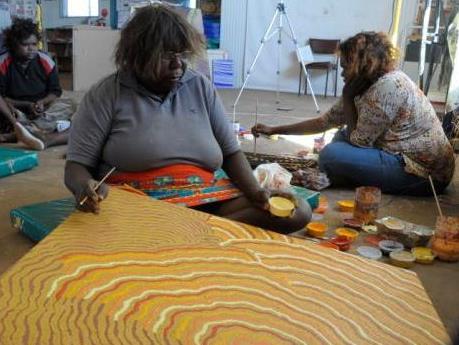Image via Papunya Tjupi Arts, a signatoryn to the voluntary Indigenous Art Code.
Unscrupulous dealers exploiting and defrauding vulnerable Indigenous artists, forged artworks being passed off as genuine, carpet baggers paying cash for art far below its true value, inferior artworks produced in squalid conditions sold to unsuspecting buyers debasing the integrity of the industry.
These abuses were identified by a Senate inquiry in 2007. They are still occurring today.
And the responsible minister, George Brandis, has refused to act to stop these abuses.
He does not even admit they exist.
A key recommendation of the 2007 Senate inquiry was the establishment of a voluntary “Indigenous Art Commercial Code of Conduct”.
The committee further recommended that the Indigenous art industry should be given the opportunity to self-regulate, but that if persistent problems remain consideration should be given to moving to a prescribed code of conduct.
Here we are in 2015, and persistent problems remain.
After a period of public consultation a voluntary Indigenous Art Code was developed in 2009 and a public company, Indigenous Art Code Limited (IartC), was established and funded by the Federal government to administer it. The Code aims to promote fair and ethical trade in works of art by Indigenous artists.
The voluntary Art Code applies to dealers who are signatories to the Code.
Dealers must act honestly, must not engage in misleading or deceptive conduct, must respect Indigenous cultural practices and artists’ rights, and must take reasonable care of artists’ artworks.
This is all very well, as far as it goes. Unfortunately it does not go far enough.
IartC was to report back to government on whether the voluntary Art Code was achieving its objectives and, if not, whether a mandatory Art Code should be introduced.
IartC reported that the industry has failed to regulate itself.
Less than one third of eligible dealers have agreed to be bound by the code.
Significant unethical and unfair treatment and exploitation of Indigenous artists continues.
IartC cannot investigate, sanction or name dealers who are not members.
IartC also reported that the only way to address the misconduct that is occurring is by means of a mandatory code under the Competition and Consumer Act.
A mandatory code will set minimum standards of conduct and will ensure that artists are treated fairly.
It will not unreasonably affect dealers who already deal with artists in a fair and reasonable manner.
It will benefit members of the public in Australia and overseas who have concerns about the provenance and authenticity of Indigenous artwork, and the fair and ethical treatment of artists.
It will secure public confidence in the integrity of the Indigenous art market.
A mandatory code has strong support from Indigenous artists, peak Indigenous organisations and arts service agencies.
There is good precedent in other sectors for the use of such a mandatory code.
The Australian Competition and Consumer Commission regulates five different mandatory codes. Australian consumers are protected everyday by the mandatory code which governs unit pricing of groceries, for example. Other mandatory codes apply to franchising, oil and wheat ports.
Former IartC Chair Ron Merkel QC tried to meet Senator Brandis to discuss what needs to be done. Brandis refused to meet him.
Recently Mr Merkel received a letter from Senator Brandis acknowledging his previous letters, noting his recommendation for a mandatory code, and stating that he has “decided not to pursue alternative regulatory options at this stage”.
That would be a mandatory code, presumably.
Brandis went on to say that he would like the Code to continue in its voluntary capacity to build on its strengths and generate “positive change” within the industry. He said he would keep the matter under review.
Brandis did not say what form of positive change he envisaged, or how he would keep the matter under review.
As Shadow Arts Minister I will continue to press for a mandatory Indigenous art code to protect vulnerable Indigenous arts workers and to protect the integrity of the industry and public confidence in it.
Brandis’s bland assurances of the success of the Code “in some areas of its operations”, again undefined, are not good enough.
Action is required to protect Indigenous artists and the Indigenous art market.
ArtsHub requested a response to this article from Senator Brandis’s office but no response has been received.





